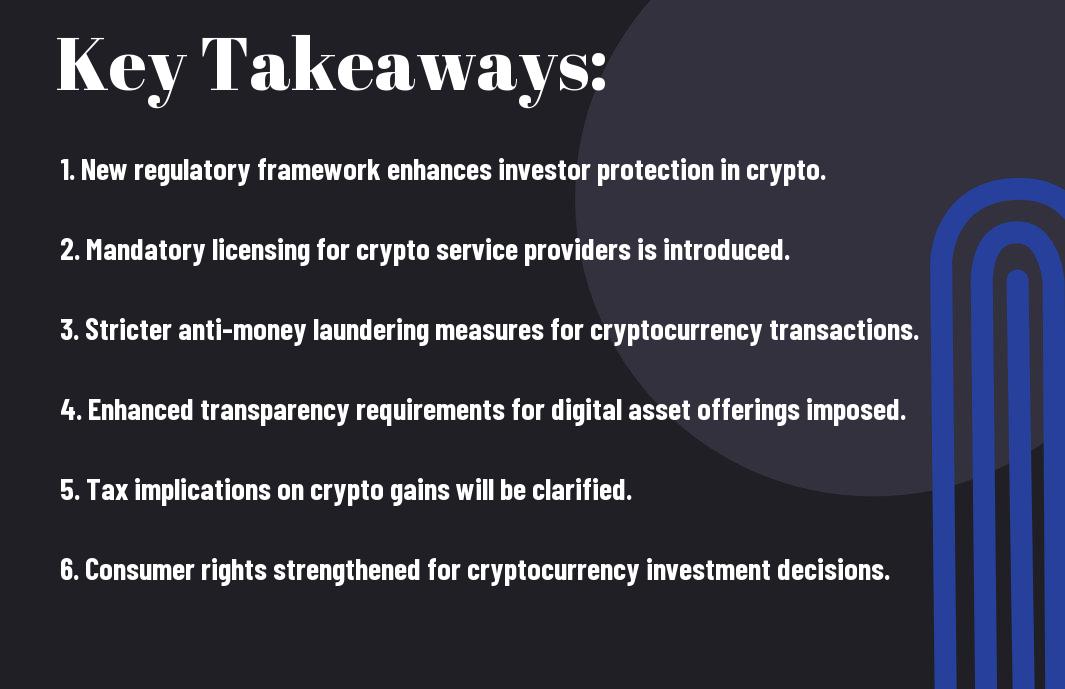Now Reading: Crypto Regulations In The EU – 5 Essential Changes Impacting Investors In 2025
-
01
Crypto Regulations In The EU – 5 Essential Changes Impacting Investors In 2025
Crypto Regulations In The EU – 5 Essential Changes Impacting Investors In 2025

Most investors in the cryptocurrency market are gearing up for significant shifts as the European Union enacts new regulations in 2025. These upcoming changes could profoundly affect your investment strategies, including stricter compliance requirements and heightened scrutiny of digital assets. Understanding these five crucial changes is vital for navigating the evolving landscape and safeguarding your financial interests. As the regulation framework tightens, being informed will empower you to make strategic decisions in this rapidly changing environment.
Key Takeaways:
- MiCA Regulation: The introduction of the Markets in Crypto-Assets (MiCA) regulation will establish a comprehensive framework for crypto-asset services across the EU, enhancing investor protection.
- Investor Identification: New requirements will mandate clear identification of investors, ensuring transparency and reducing anonymity in crypto transactions.
- Stablecoin Oversight: Stricter regulations on stablecoins will be implemented to ensure their stability and protect users against potential risks associated with their volatility.
- Advertising Standards: Enhanced advertising and marketing requirements will be enforced, aiming to prevent misleading claims and ensure that investors are better informed about the risks.
- Increased Compliance Requirements: Service providers must meet elevated compliance standards, including anti-money laundering (AML) and counter-terrorism financing (CTF) regulations, affecting how investments are facilitated.

Overview of Current Crypto Regulations in the EU
Before venturing into upcoming changes, it’s important to understand the current landscape of crypto regulations in the EU. Currently, the European Union operates under a patchwork of regulations, focusing primarily on consumer protection, anti-money laundering (AML), and tax compliance. Each member state may have its own set of rules, leading to disparities that can affect your ability to invest and trade in cryptocurrencies across borders.
Historical Context
After the initial boom of cryptocurrencies in 2017, the EU began to take notice, which spurred a wave of regulatory activity. Governments and regulatory bodies feared the impact of crypto on financial systems and illicit activities, prompting them to develop frameworks focused on transparency and security.
Key Regulatory Bodies
Overview, the EU relies on various regulatory agencies to oversee the crypto market. The European Securities and Markets Authority (ESMA) plays a pivotal role in ensuring investor protection and market integrity. Additionally, the European Central Bank (ECB) is involved in monitoring the impact of cryptocurrencies on monetary policy, while national regulators enforce local laws. These bodies work collectively to establish a secure environment for crypto investors.
Also, these regulatory bodies often collaborate with blockchain associations and industry stakeholders to shape policies that balance innovation with safety. The agencies focus on implementing anti-money laundering measures, consumer safeguards, and promoting transparency. Their decisions can significantly affect your investment strategies and market dynamics. Understanding their roles is necessary as you navigate the landscape of EU crypto investments.
Essential Changes Coming in 2025
If you are an investor in the crypto space, 2025 will bring significant changes in regulations that could reshape your experience. The European Union is implementing various measures that aim to enhance market integrity, protect consumers, and combat illicit financial activities. These adjustments will be vital for how you navigate the evolving landscape of cryptocurrency investments.
Enhanced Consumer Protection Measures
One of the key changes you can expect is the introduction of enhanced consumer protection measures. These regulations will ensure that your investments are better safeguarded, providing clear guidelines on the responsibilities of crypto service providers. This structure aims to boost your confidence in using cryptocurrencies and related services.
Stricter Anti-Money Laundering (AML) Policies
Measures aimed at enforcing stricter anti-money laundering (AML) policies will also be a significant aspect of the 2025 regulations. These policies will require crypto exchanges and service providers to conduct thorough identity checks and monitor transactions more meticulously.
Enhanced obligations for AML compliance will strengthen the transparency of transactions, making it more difficult for illicit activities to flourish in the crypto space. As an investor, you’ll benefit from a more reputable market, knowing that businesses are obligated to perform detailed due diligence and reporting.
Taxation Reforms for Crypto Assets
Against the backdrop of increasing scrutiny, taxation reforms for crypto assets are expected to be implemented. These guidelines will clarify your tax obligations when trading or holding cryptocurrencies, ensuring that you are informed and compliant with the evolving tax landscape.
Even as tax obligations become clearer, you may face increased reporting requirements, which could affect your investment strategies. Therefore, it’s imperative to stay abreast of these reforms to avoid any potential pitfalls associated with your tax responsibilities.
Framework for Stablecoins
Measures that focus on a comprehensive framework for stablecoins will also be introduced in 2025. This framework aims to establish standards that these digital assets must meet to ensure stability and security, which is vital for your investment decisions.
Consequently, with a defined framework in place, you can expect improved protections when dealing with stablecoins. This will foster trust in their use, making them a more attractive option for investments and everyday transactions in your crypto portfolio.
Implications for Investors
Many investors will need to reassess their strategies as the upcoming European Regulatory Timeline 2025 – Insights signify a shift in compliance and transparency requirements. The changes could lead to heightened scrutiny, impacting everything from trading practices to asset management. Adapting to these regulations will be necessary to navigate risks effectively.
Impact on Investment Strategies
Between regulatory changes and evolving market dynamics, you must adapt your investment strategies to stay competitive. Enhanced compliance protocols may shift your focus toward lower-risk assets or necessitate a reevaluation of your existing portfolio allocations. Consider diversifying your investments to align with the new regulatory landscape.
Navigating Compliance Requirements
Any oversight in adhering to the new regulations can result in significant penalties. Compliance will no longer be optional for you as an investor; it will be necessary. Understanding the upcoming changes will help you cultivate a robust strategy that minimizes risks and ensures that you remain compliant.
Another key aspect to consider is that the strict compliance requirements may demand more time and resources from you. You will need to stay updated on the latest regulatory developments and ensure your transactions follow the new rules. This might include implementing new reporting mechanisms or adopting enhanced due diligence processes. While this can seem daunting, embracing these changes positions you as a responsible investor, potentially attracting more opportunities within the rapidly evolving crypto landscape.
Future of Crypto Regulation in the EU
Keep an eye on the evolving landscape of crypto regulation in the EU as it aims to create a safer environment for your investments. The anticipated frameworks will introduce transparency and uniform standards across member states. For more on the Important changes in cryptocurrency regulations in 2025, you should stay informed to navigate these changes effectively.
Potential Challenges and Opportunities
An increase in regulation may lead to heightened compliance costs and operational challenges for crypto businesses. However, this also opens doors for trustworthy platforms to thrive, providing you with more secure investment opportunities.
Predictions for Long-Term Regulatory Landscape
Among the long-term changes, expect more significant government influence over crypto markets, shaping them toward consumer protection and market integrity. You may see tax regulations adapted specifically for crypto assets and guidelines that enhance interoperability across different jurisdictions.
It is anticipated that the EU will establish a comprehensive regulatory framework that promotes innovation while safeguarding investors like you. Striking the balance between regulation and growth will be a primary objective, allowing for a more stable and predictable environment. However, regulatory adjustments could also lead to increased compliance burdens, impacting your investment landscape significantly. Keep an eye on these trends to ensure your strategies align with upcoming regulations.
Conclusion
Following this overview, it’s important for you to stay informed about the evolving crypto regulations in the EU. The five important changes set to impact investors by 2025 will reshape your investment landscape, offering both challenges and opportunities. By understanding these regulations, you can better strategize your investments and ensure compliance, ultimately safeguarding your interests in the dynamic world of cryptocurrency.
FAQ
Q: What are the upcoming changes in the EU crypto regulations expected to take effect in 2025?
A: In 2025, the EU plans to implement several key changes in crypto regulations that aim to enhance consumer protection, increase market stability, and ensure compliance with anti-money laundering (AML) standards. Key updates include stricter licensing requirements for crypto service providers, enhanced transparency measures for crypto transactions, and guidelines for the classification of digital assets. These changes are part of a broader effort to standardize regulations across all member states and strengthen the framework for digital finance.
Q: How will these regulations impact cryptocurrency investors in the EU?
A: The new regulations will significantly impact cryptocurrency investors by establishing clearer guidelines on investment practices and the rights of investors. Enhanced protections will be put in place to safeguard retail investors, reducing the potential for fraud and market manipulation. Additionally, investors will benefit from increased transparency around crypto assets, which should help in making informed investment decisions. Lastly, non-compliance by cryptocurrency providers may lead to stricter penalties, providing a more secure environment for investors.
Q: Will the new regulations affect the availability of cryptocurrencies and crypto services in the EU?
A: Yes, the new regulations are expected to change the landscape of available cryptocurrencies and crypto services in the EU. As companies will need to comply with licensing and operational requirements, some smaller or unregulated services may cease to operate within the EU. However, this could lead to a more robust and secure market where only compliant and trustworthy entities can provide services, ultimately fostering a safer environment for users.
Q: How do these regulations align with global trends in cryptocurrency regulation?
A: The EU’s regulations reflect a global trend toward standardizing cryptocurrency governance. Many countries are moving toward enhanced regulations to manage risks and provide clear frameworks for digital assets. The EU is aligning with these global efforts by promoting transparency and consumer protection. By establishing a cohesive regulatory environment, the EU intends to position itself as a leader in the global crypto market, balancing innovation with necessary oversight.
Q: What actions should investors take in preparation for these regulatory changes?
A: Investors should stay informed about the evolving regulatory landscape and review their investment strategies accordingly. It is advisable to assess the compliance status of their crypto service providers and ensure that they are dealing with licensed and regulated platforms. Additionally, educating themselves about the risks associated with cryptocurrency investments and being mindful of the implications of these new regulations will help investors to navigate the upcoming changes effectively.
























